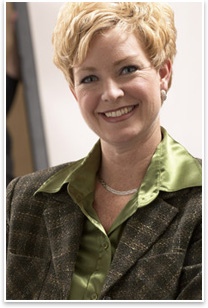The Secret to “Likeability”
Is it a skill set worth developing?
by Pam Holloway
Business psychologist
How Do You . . . decide if “likeability” is a skill set worth pursuing?
Summary: Strange as it might seem, likeability is not a gift—it’s a skill set. Is it worth developing? You decide. Here’s what we know about likeable people:
- They are more successful in business and in life
- They get elected, promoted, and rewarded more often than those less likable
- They close more sales and make more money
- They get better service from all types of service providers, including doctors and other health care providers (which means they may live longer as well!).
 Still not sure? Consider a Columbia University study by psychologist Melinda Tamkins, which shows that success in the workplace is guaranteed not by what or whom you know but by your popularity. In her study, Tamkins found that "popular workers were seen as trustworthy, motivated, serious, decisive, and hardworking and were recommended for fast-track promotion and generous pay increases. Their less-liked colleagues were perceived as arrogant, conniving, and manipulative; pay rises and promotions were ruled out regardless of their academic background or professional qualifications." Still not sure? Consider a Columbia University study by psychologist Melinda Tamkins, which shows that success in the workplace is guaranteed not by what or whom you know but by your popularity. In her study, Tamkins found that "popular workers were seen as trustworthy, motivated, serious, decisive, and hardworking and were recommended for fast-track promotion and generous pay increases. Their less-liked colleagues were perceived as arrogant, conniving, and manipulative; pay rises and promotions were ruled out regardless of their academic background or professional qualifications."
The Gallup organization has conducted a personality factor poll prior to every presidential election since 1960. Only one of three factors—issues, party affiliation, and likeability—has been a consistent prognosticator of the final election result. Of course, the factor is likeability.
 What makes you likable? What makes you likable?
We find a plethora of opinions as to the specific elements that contribute to likeability. Tim Sanders in his book, The Likeability Factor, notes these four:
- Friendliness: Ability to communicate liking and openness to others
- Relevance: Capacity to connect with others' interests, wants, and needs
- Empathy: Ability to recognize, acknowledge, and experience other people's feelings
- Realness: Integrity that stands behind your likeability and guarantees its authenticity.
Seven components of likeability
Through research and experience, we have found that these seven elements are integral for “likeability”:
- Having a positive mental attitude: Likeable people exude a positive mental attitude. That does not mean they are silly or giddy. They don’t ignore hardships or failures, but consciously reframe those difficulties and negative emotions to healthier positive ones. Positive means that you can find a better direction out of a problem, rather than wallowing in the problem or negative emotion.
- Non-judgmental: The truly likable are non-judgmental. They recognize that everyone is trying to get by the best they know how, and they treat everyone with respect and understanding.
- Open: Passing critical judgment is a sign of inflexibility, a highly unlikeable trait. The opposite of that is what we call “openness.” The truly likeable are open to new people, other ideas, and different ways of doing things. They demonstrate openness in their behavior, the tone of their voice, and in their language.
 Secure: Likeable people are “comfortable in their own skin.” They don’t feel the need to talk over, correct, constantly make jokes, or laugh nervously. They don’t brag, talk incessantly, or hide behind details or humor. Secure: Likeable people are “comfortable in their own skin.” They don’t feel the need to talk over, correct, constantly make jokes, or laugh nervously. They don’t brag, talk incessantly, or hide behind details or humor.- Vulnerable: One of the most likeable characteristics is vulnerability. People who can say, “I don’t know,” who are able to admit mistakes or show a sensitivity are seen as more likeable.
- Able to get outside the self: Those persons whose primary focus is on themselves rate low on the likeability scale. Conversely, those who are secure in themselves and able to turn their focus outward rate much higher. It’s part empathy—our ability to recognize, acknowledge, and experience other people’s feelings, which is a key attribute of likeability. This is more than the ability to be empathetic. It is the exercise of this ability. It is about becoming relevant. We become relevant in the lives of others when we learn about their interests, wants, and needs.
- Liking others: We like people who like us. We also like people who are like us. As humans, we are constantly seeking points of similarity. We look for and are attracted to people who are like us in terms of values, interests, and experiences. Studies suggest we are also attracted to people who physically look like us.
 More exposure: Familiarity breeds likeability More exposure: Familiarity breeds likeability
Recent studies have shown that more exposure is sufficient to increase the likeability of a person (or an object). In short, we are more attracted to and tend to like people who are familiar to us. So, in a marketing situation, if the prospect likes you a little when you meet the first time, he or she may like you even more the second time and so on. With that in mind, your objective is to continue to increase the numbers of exposure to your prospects.
How likeable are you?
How well would you say you demonstrate those likeability characteristics in your meetings with prospects? The key word here is “demonstrate.” You can “feel” as though you are being open, relevant, or empathetic, but that doesn’t necessarily mean that’s how you are being perceived by the prospects.
On a scale of 1–10, where 10 is extremely high, how would you rate your demonstration of:
 —Positive mental attitude —Positive mental attitude
—Being non-judgmental
—Openness
—Feeling secure
—Vulnerability
—Able to get outside of self
—Own likeability.
Whether we like it or not, likeability makes a difference in all aspects of how we are perceived. Our likeability follows us all at home, at work, and in social settings. The important thing to remember is that it doesn’t really matter what we think of ourselves when it comes to others making decisions about us. |


 Still not sure? Consider a Columbia University study by psychologist Melinda Tamkins, which shows that success in the workplace is guaranteed not by what or whom you know but by your popularity. In her study, Tamkins found that "popular workers were seen as trustworthy, motivated, serious, decisive, and hardworking and were recommended for fast-track promotion and generous pay increases. Their less-liked colleagues were perceived as arrogant, conniving, and manipulative; pay rises and promotions were ruled out regardless of their academic background or professional qualifications."
Still not sure? Consider a Columbia University study by psychologist Melinda Tamkins, which shows that success in the workplace is guaranteed not by what or whom you know but by your popularity. In her study, Tamkins found that "popular workers were seen as trustworthy, motivated, serious, decisive, and hardworking and were recommended for fast-track promotion and generous pay increases. Their less-liked colleagues were perceived as arrogant, conniving, and manipulative; pay rises and promotions were ruled out regardless of their academic background or professional qualifications." What makes you likable?
What makes you likable? Secure:
Secure: More exposure: Familiarity breeds likeability
More exposure: Familiarity breeds likeability —Positive mental attitude
—Positive mental attitude